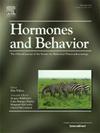Oxytocin administration rescues the negative impacts of social isolation on wound healing in mice
IF 2.5
3区 医学
Q2 BEHAVIORAL SCIENCES
引用次数: 0
Abstract
In humans and animals, social isolation leads to worsened health outcomes in many disease areas, including wound healing. Oxytocin, a prosocial hormone with anti-inflammatory properties, has been strongly implicated in the salutary benefits of social relationships. Oxytocin administration can mitigate the negative effects of social isolation on health outcomes, as demonstrated in rat and hamster wound healing models. However, little research has been conducted with mice, which are more common laboratory animal models, and which have markedly different social structures from these other rodent species. Moreover, the effects of social isolation and oxytocin administration on wound healing have not been investigated in mice within the same experiment, nor have they been compared between males and females. Here, we housed male and female C57BL/6 mice (n = 40) in social isolation or same-sex pairs. Mice received a subcutaneous biopsy punch wound and were subsequently administered IP oxytocin or placebo daily for 14 days. Socially isolated mice administered oxytocin, and pair-housed mice administered either oxytocin or placebo, showed a significantly faster decrease in wound area and more collagen fiber variance (i.e., less scar tissue) compared to socially isolated mice administered placebo. No sex differences were observed in any outcome measure. Thus, social housing and oxytocin administration each non-additively reduce the negative effects of social isolation on wound healing in mice. Oxytocin administration may be a promising pharmacological strategy by which to improve post-surgical healing in animals and humans, especially in those where limited social contact is necessary or in those with sparse social networks.
催产素可以缓解社交隔离对小鼠伤口愈合的负面影响
在人类和动物中,社会隔离导致许多疾病领域的健康状况恶化,包括伤口愈合。催产素是一种具有抗炎特性的亲社会激素,与社会关系的有益益处密切相关。正如在大鼠和仓鼠伤口愈合模型中所证明的那样,催产素管理可以减轻社会隔离对健康结果的负面影响。然而,很少对小鼠进行研究,小鼠是更常见的实验动物模型,并且与其他啮齿动物物种具有明显不同的社会结构。此外,社会隔离和催产素对伤口愈合的影响尚未在同一实验中对小鼠进行过研究,也没有在雄性和雌性之间进行过比较。在这里,我们将雄性和雌性C57BL/6小鼠(n = 40)置于社会隔离或同性配对中。小鼠接受皮下穿刺活检,随后每天给予催产素或安慰剂,持续14天。与社会隔离小鼠给予安慰剂相比,社会隔离小鼠给予催产素,成对饲养小鼠给予催产素或安慰剂,伤口面积的减少速度明显更快,胶原纤维变异更多(即疤痕组织更少)。在任何结果测量中均未观察到性别差异。因此,社会住房和催产素管理各自非加性地减少了社会隔离对小鼠伤口愈合的负面影响。催产素管理可能是一种很有前途的药理学策略,通过它可以改善动物和人类的术后愈合,特别是在那些社会接触有限或社会网络稀疏的地方。
本文章由计算机程序翻译,如有差异,请以英文原文为准。
求助全文
约1分钟内获得全文
求助全文
来源期刊

Hormones and Behavior
医学-行为科学
CiteScore
6.70
自引率
8.60%
发文量
139
审稿时长
91 days
期刊介绍:
Hormones and Behavior publishes original research articles, reviews and special issues concerning hormone-brain-behavior relationships, broadly defined. The journal''s scope ranges from laboratory and field studies concerning neuroendocrine as well as endocrine mechanisms controlling the development or adult expression of behavior to studies concerning the environmental control and evolutionary significance of hormone-behavior relationships. The journal welcomes studies conducted on species ranging from invertebrates to mammals, including humans.
 求助内容:
求助内容: 应助结果提醒方式:
应助结果提醒方式:


